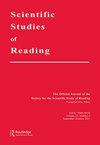阅读自我信念的大鱼小塘效应:2018年PISA的跨国探索
IF 2.4
2区 教育学
Q1 EDUCATION & EDUCATIONAL RESEARCH
引用次数: 2
摘要
摘要目的过去的研究表明,“大鱼小池塘效应”(BFLPE;学校平均成绩对学生学业自我概念的负面影响)在各国普遍存在。然而,这些证据在很大程度上仅限于数学和科学。鉴于阅读自我概念与数学和科学自我概念高度不同,在预测教育结果方面发挥着重要作用,因此有必要研究BFLPE的普遍性及其在该领域内潜在的社会比较过程。方法我们使用2018年国际学生评估计划(来自72个国家的533165名学生),评估BFLPE对15岁学生阅读自我概念的跨国可推广性。为了证明BFLPE是在相对而非绝对的参照系中进行比较的,我们将一般阅读所经历的困难(自我概念感知困难;相对参照系)与PISA测试期间阅读所遇到的困难(PISA测试困难;绝对参照系)并列。结果我们的研究结果表明,阅读自我概念感知能力和难度分量表的BFLPE在各国都很强。此外,BFLPE在自我概念分量表中很强,但在PISA测试难度表中很弱。结论我们的研究结果支持了BFLPE对阅读自我概念的可推广性,并强调了社会比较过程在这种影响下的作用。本文章由计算机程序翻译,如有差异,请以英文原文为准。
The Big-Fish-Little-Pond Effect for Reading Self-Beliefs: A Cross-National Exploration with PISA 2018
ABSTRACT Purpose Past research shows the Big-Fish-Little-Pond Effect (BFLPE; negative effect of school-average achievement on student-level academic self-concept) to generalize across countries. However, such evidence is largely limited to math and science. Given that reading self-concept is highly differentiated from math and science self-concepts and plays an important role in predicting educational outcomes, it is essential to examine the universality of the BFLPE and its underlying social-comparison process within this domain. Method We assess the cross-national generalizability of the BFLPE for 15-year-olds’ reading self-concept using Programme for International Students Assessment 2018 (533,165 students, 72 countries). To demonstrate that the BFLPE operates with a relative—rather than absolute—frame of reference for comparison, we juxtapose difficulty experienced with reading in general (self-concept perceived difficulty; relative frame of reference), with difficulty experienced with reading specifically during the PISA test (PISA test difficulty; absolute frame of reference). Results Our findings show that the BFLPE for both the reading self-concept perceived competence and difficulty subscales was robust across countries. Further, the BFLPE was strong for self-concept subscales, but very weak for the PISA test difficulty scale. Conclusions Our findings extend support for the generalizability of the BFLPE to reading self-concept and highlight the role of social comparison processes underlying this effect.
求助全文
通过发布文献求助,成功后即可免费获取论文全文。
去求助
来源期刊

Scientific Studies of Reading
Multiple-
CiteScore
7.20
自引率
2.70%
发文量
26
期刊介绍:
This journal publishes original empirical investigations dealing with all aspects of reading and its related areas, and, occasionally, scholarly reviews of the literature, papers focused on theory development, and discussions of social policy issues. Papers range from very basic studies to those whose main thrust is toward educational practice. The journal also includes work on "all aspects of reading and its related areas," a phrase that is sufficiently general to encompass issues related to word recognition, comprehension, writing, intervention, and assessment involving very young children and/or adults.
 求助内容:
求助内容: 应助结果提醒方式:
应助结果提醒方式:


